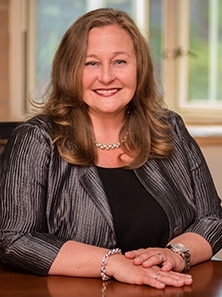The Graduate School of Social Work (GSSW) invites students (both undergraduate and graduate) of all disciplines to take part in their robust community.
Amanda Moore McBride, PhD, dean of DU’s Graduate School of Social Work, has woven her passion for social entrepreneurship into the school’s modus operandi.
“When I joined GSSW, I was just finishing up a book on social innovation and civic engagement,” said McBride. “I think, in many ways, the book describes the approach we take at GSSW. It is about the development of an innovator’s mindset. What does it mean to look at problems in the world and think about their roots, while also creatively imagining new possibilities for human existing and thriving?”
McBride has a long tenure in the field of social innovation. She managed one of the first certificates in social entrepreneurship in the nation when she was at Washington University in St. Louis, Missouri. Since then, her approach to the subject has evolved. Today, she emphasizes the need to create a mindset that allows social workers and social entrepreneurs to lead teams effectively, generate creative solutions, and be driven by the communities most affected by deeply entrenched social issues.
“Our training and curricular opportunities put people from different backgrounds and different disciplines together to think about, for example, homelessness. What does it mean to move innovations from being community-engaged to being community-driven? At GSSW, our faculty partner with those who are impacted by, who are living the issues. Together, solutions are possible,” said McBride.
Kimberly Bender, a professor at the Graduate School of Social Work, said faculty members are given the freedom to collaborate and create courses that serve dynamic interests and backgrounds.
“I have been here for 13 years,” said Bender. “Yet, it was only a handful of years ago that I got invested in design and entrepreneurship. I was a Project X-ITE faculty fellow, and I met faculty across campus who were doing work related to social innovation, human-centered design and so on. When I served as faculty director of Project X-ITE for a year, I met a lot of folks doing this work. Through those connections, I co-designed some courses for graduate students centered around those topics.”
Many of these classes offer interdisciplinary appeal. The course Teaching Human-Centered Design, developed and taught by Bender and Computer Science Associate Professor Matt Rutherford in spring 2018, brought students in collaboration with youth at Urban Peak, a Colorado nonprofit serving young people experiencing homelessness. The class brought together students from GSSW, Josef Korbel School of International Studies, Daniels College of Business, Ritchie School of Engineering and Computer Science, and the Emergent Digital Practices program.
This hands-on, interdisciplinary class is one example of GSSW’s mission. “We don’t position ourselves to merely ‘inform’ or ‘teach’ the community — we host and design a space that gets the energy moving, where ideas can evolve,” Bender said. “We get to creatively think about where things aren’t working, and we can consider other ways to think about these issues.”
McBride said GSSW seeks students who don’t necessarily share a specific background or discipline, but rather, a particular mindset. She invites student entrepreneurs from across campus to consider connecting with GSSW.
“Whether they are social workers or social entrepreneurs, many will claim, ‘People are hurting, and I want to help,’” McBride said. “Instead of this, we hope those engaging in the social sector will ask, ‘How can I learn from you? How can we learn together? How can I be a support to where you are now and where you want to go?’ This could be an organization, or a legislator advancing particular social policy, or it could be an individual who is in crisis.”
McBride said this shift in education reflects changes across the entire field of social work.
“Social work is collectively interrogating its past and applying diversity, equity and inclusion principles to current practice. For a long time, we have put social workers instead of the people affected by the issues at the center of helping. The [people affected] have the solutions, but just haven’t been empowered or organized or even simply asked what they think.”
Nearly every course in the Graduate School of Social Work is open to all undergraduate and graduate students across the University of Denver. Students interested in DEI, engaging with communities, and evaluating social outcomes are invited to enroll in one of the school’s many interdisciplinary courses. For example, GSSW’s concentration on organizational leadership may appeal to entrepreneurs with budding startups.
Beyond the classroom, GSSW offers a full program of community events every quarter. National speakers discuss subjects like social innovation, mutual aid, collective care and other topics social entrepreneurs can implement in their ventures.
Want to learn more? Contact GSSW Dean Amanda Moore McBride (gsswdean@du.edu).

